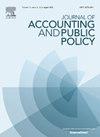Valuation of shareholder dissenting votes when management is entrenched
IF 2.2
3区 管理学
Q1 BUSINESS, FINANCE
引用次数: 0
Abstract
We investigate the valuation implications of shareholder dissenting votes as a disciplining mechanism in the context of management entrenchment. Our study is motivated by the controversy surrounding shareholder voting, which led to the 2010 U.S. Securities and Exchange Commission (SEC) rules that accelerated and enhanced the disclosure of shareholder voting outcomes. We find adverse and economically meaningful market reactions to the initial disclosure of greater shareholder dissenting votes when management is more entrenched. However, we observe a subsequent positive market reaction to the announcement of CEO dismissal in firms with greater shareholder dissent and entrenched management. An array of supplementary and robustness analyses further support our results. Collectively, our findings suggest that investors have low expectations of board effectiveness when shareholder dissenting votes are greater and management is more entrenched, but the unexpected dismissal of an entrenched CEO represents a surprise that is welcomed by the market. Overall, our evidence clarifies the ongoing debate in the literature about the value of shareholder voting by demonstrating that management entrenchment is a channel for explaining the disciplining role of shareholder voting. Our findings support the SEC’s contention that more timely and prominent disclosure of shareholder voting results benefits capital market participants. Our study also informs consideration of the use of technology (e.g., blockchain) to expand shareholder participation in corporate voting.
当管理层根深蒂固时,股东反对票的估值
我们调查了股东反对投票作为一种纪律机制在管理壕沟的背景下的估值影响。我们研究的动机是围绕股东投票的争议,这导致2010年美国证券交易委员会(SEC)规则加速和加强了股东投票结果的披露。我们发现,当管理层更加根深蒂固时,市场会对最初披露的更多股东反对投票做出不利且具有经济意义的反应。然而,我们观察到,在股东意见分歧较大、管理层根深蒂固的公司中,CEO被解雇的消息随后出现了积极的市场反应。一系列补充和稳健性分析进一步支持了我们的结果。总的来说,我们的研究结果表明,当股东反对票更多、管理层更根深蒂固时,投资者对董事会有效性的期望较低,但一位根深蒂固的首席执行官意外被解雇,代表了一个受到市场欢迎的意外。总体而言,我们的证据澄清了文献中关于股东投票价值的持续争论,证明了管理堑壕是解释股东投票纪律作用的一个渠道。我们的研究结果支持了SEC的观点,即更及时、更突出地披露股东投票结果有利于资本市场参与者。我们的研究还考虑了使用技术(例如b区块链)来扩大股东在公司投票中的参与。
本文章由计算机程序翻译,如有差异,请以英文原文为准。
求助全文
约1分钟内获得全文
求助全文
来源期刊

Journal of Accounting and Public Policy
Multiple-
CiteScore
4.80
自引率
2.80%
发文量
75
期刊介绍:
The Journal of Accounting and Public Policy publishes research papers focusing on the intersection between accounting and public policy. Preference is given to papers illuminating through theoretical or empirical analysis, the effects of accounting on public policy and vice-versa. Subjects treated in this journal include the interface of accounting with economics, political science, sociology, or law. The Journal includes a section entitled Accounting Letters. This section publishes short research articles that should not exceed approximately 3,000 words. The objective of this section is to facilitate the rapid dissemination of important accounting research. Accordingly, articles submitted to this section will be reviewed within fours weeks of receipt, revisions will be limited to one, and publication will occur within four months of acceptance.
 求助内容:
求助内容: 应助结果提醒方式:
应助结果提醒方式:


